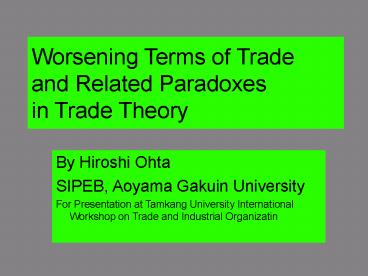:HO - PowerPoint PPT Presentation
1 / 15
Title: :HO
1
Worsening Terms of Trade and Related Paradoxes
in Trade Theory
By Hiroshi Ohta SIPEB, Aoyama Gakuin
University For Presentation at Tamkang University
International Workshop on Trade and Industrial
Organizatin
2
?? by ??An attempt at Bonsai economics by
a bonsai economist. Even with no expertise in
international trade one can do some trimming work
at least on a dwarfed picture of the real world,
which I also call diagranomics pedagogica. What I
will do include the following.
- Trimming scissors shall be applied to some
paradoxes or puzzles in trade theory. - We begin with the latest one called technology
transfer paradox, which may be also called
worsening terms of trade paradox. - We show either one no more paradox than the
Leontief paradox is. - We also probe what may be called worsening terms
of exchange, or real factor price, that is more
intra-national than international phenomenon. Yet
it comes out as a stumbling block to
international trade. - While reexamining the classic Stolper-Samuelson
theorem on the aggravating welfare effect of
factor price equalization we also ponder their
related recommendation to bribe those adversely
affected from trade as a means to overcome the
difficulty underlying therein.
3
Objectives, Motivation, and Literature
- Two Objectives1) Interpreting some paradoxes in
international trade theory 2) Probing the
Stolper-Samuelson proposal to bribe those
adversely affected from trade - Literature
- Ronald Jones and Roy Ruffin (mimeo, 2005)
- Roy Ruffin and Ronald Jones (RIE, 2005)
- Xiangshuo Yin (WEP, 2002)
- Hiroshi Ohta (mimeo, 2005)
- Wolfgang Stolper and Paul Samuelson (RES, 1941)
4
Method Diagranomics
- Simplest Possible Math
- No Messmatics
5
N
U
PPF
Autarky
I0/B0
Short-Run Income/Budget Line after Worsening
Terms of Trade
I1/B1
Long-Run Income/Budget Line after Worsening
Terms of Trade
B
Worsening Terms of Trade Paradox
6
H-O Orthodoxy
Capital-Rich Country N Labor-Rich Country B N Is
Capital-Intensive Good B Is Labor-Intensive Good
Basic Assumptions
N
Outcomes after Trade
N Exports N Capital Gains, Labor Loses
B Exports B Capital Loses, Labor Gains
B
7
Conclusions Opposite to H-OsLeontief Paradox
Resolved
The Same Basic Assumptions but on Tastes
N
N Exports B, B Exports N Ns Labor and Bs
Capital Gain, While the Other Classes Lose
H.O. Heresy?
B
8
N
I/B before Theft
I/B after Theft
PPF
PPF after Theft
U
PPF
B
I/B before Theft
Technology Transfer Paradox a la Ruffin/Jones
9
QHT
U
PPF
QLT
The North Tech Degeneration Bad Luck to the
South? Not Necessarily Yins Paradox
10
N
UB(B, N)
UN(B, N)
EP
EC
EA
B
Paradox of Bad Luck
11
2x2x2 CGE Model with TradeSystem of Equations
Assumed
12
General Equilibrium on CC and PPF Before/After
Trade
N
ENA
EBA
K
EBA
ENA
B
L
Productive Optimum before/after Trade
Allocation Optimum before/after Trade
13
CGE An Extreme Example a 2/3, LN 0
N
Bs Income Line Before Trade
EBA
ENA
K
EBA
ENA
B
L
Productive Optimum before/after Trade
Allocation Optimum before/after Trade
14
When a 2/3 and LN 0 B 1, N 0 for B, yet
yB 1, and yN gt 1 because p 21/3 gt 1.
N
Bs Workers Are Rich Their BL Before Trade
w (2/3)21/3
Common BL After Trade Everybody Equal
r (1/3)21/3
Ns Capitalists Are Rich Their BL Before Trade
B
r 1/3
w 2/3
Budget Lines Before and After Trade
15
Concluding Remarks
- We begin with the recent one called technology
transfer paradox, which may be interpreted more
generally in terms of what I call the worsening
terms of trade paradox. We show both paradoxes
are no more paradox than the Leontief paradox is.
- We also probe what may be called worsening terms
of exchange, which is more intra-national than
international phenomenon. Yet it comes out as a
stumbling block to international trade. - While reexamining the classic Stolper-Samuelson
theorem on the aggravating welfare effect of
factor price equalization we also ponder their
related recommendation to bribe those adversely
affected from trade as a means to overcome the
difficulty underlying therein.































